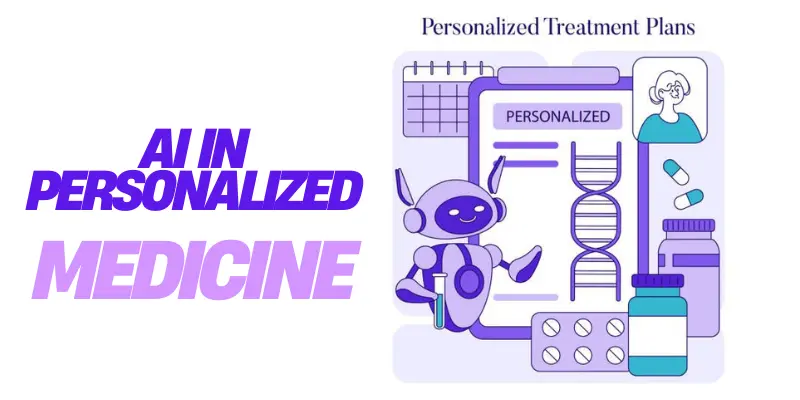The Role of AI in Creating Personalized Medicine Plans
Published: 4 Apr 2025
Imagine a patient named Aslam, diagnosed with breast cancer. Traditional treatment approaches would undergo a standard regimen of chemotherapy but the doctors decide to use a different approach. They analyze his genetic data, medical history and lifestyle using advanced AI tools. Within hours, the AI-driven system provides a customized treatment plan, specifically designed for Aslam’s unique cancer profile. This is the future of AI in Personalized Medicine where technology is transforming healthcare by offering customized treatments that are more effective and less invasive, helping patients like Aslam get the care they truly need.

What is AI in Personalized Medicine
Think of AI in Personalized Medicine like a GPS system guiding you on a road trip. Instead of giving everyone the same directions, it adjusts the route based on your current location, traffic and preferences, ensuring you get to your destination in the best possible way. Similarly, AI in personalized medicine customizes treatments for each patient based on their unique genetic information, health history and lifestyle.
From a technical POV, AI in personalized medicine uses machine learning algorithms and data analysis to process vast amounts of health data. This allows doctors to create tailored treatment plans, predict how a patient will respond to certain therapies and optimize care based on individual needs.
The Importance of AI in Personalized Medicine
AI is changing the way healthcare is delivered by making treatments more precise and effective than ever before. By utilizing advanced algorithms and vast amounts of data, AI is helping doctors to design care for individual patients. Here’s why AI in personalized medicine is so important:
- Tailored Treatments: AI allows healthcare providers to create customized treatment plans based on a patient’s unique genetic and health data.
- Increased Effectiveness: By analyzing vast amounts of data, AI identifies the most effective therapies for each patient, improving the chances of success.
- Fewer Side Effects: Personalized treatments reduce the risk of adverse reactions by targeting specific conditions and needs.
- Improved Diagnosis: AI helps in detecting conditions earlier and more accurately by analyzing patterns in medical data.
- Faster and Smarter Decisions: AI streamlines the process of identifying the best course of action which allows for quicker and more informed medical decisions.
The Working Procedure of AI in Personalized Medicine
AI in Personalized Medicine works by integrating vast amounts of patient data including genetic, medical history and lifestyle information to create personalized treatment plans. Here is a step by step breakdown for understanding the process;

- Data Collection: AI begins by gathering comprehensive data from patients which includes genetic information, medical history and lifestyle choices.
- Data Analysis: AI algorithms analyze this data to identify patterns, correlations and potential risks associated with specific treatments.
- Treatment Predictions: Based on the data analysis, AI predicts how patients will respond to various treatments, ensuring personalized care.
- Recommendation Generation: AI provides healthcare professionals with tailored treatment plans based on its findings, offering the most effective options for the patient.
- Continuous Learning: As new data is collected, AI refines its recommendations by adapting treatment plans as patients’ conditions change.
- Doctor’s Role: Healthcare providers use the AI-generated recommendations to make informed decisions, further enhancing patient outcomes.
Common Misconceptions About AI in Personalized Medicine
- AI Replaces Doctors: One of the biggest misconceptions is that AI will replace human doctors. In reality, AI is a tool that is designed to support healthcare providers by providing data-driven insights. It assists doctors in making more informed decisions but the doctor’s expertise and judgment are still essential in the treatment process.
- AI Can Predict Everything: While AI can predict treatment responses based on available data, it cannot account for every variable such as unforeseen side effects or changes in a patient’s condition. AI’s predictions are based on patterns from past data but medical care always involves human oversight and flexibility.
- AI Is a One-Time Solution: AI in personalized medicine is not a one-and-done process. It requires continuous learning from new patient data and ongoing adjustments to treatment plans. The goal is not just to create one time treatment but to adapt and refine care over time as the patient’s health evolves.
- AI Can Only Handle Simple Cases: Some believe that AI is best suited for straightforward cases. However, AI shines in complex and data-heavy situations such as cancer treatment or rare genetic disorders, where personalized medicine is crucial. AI’s ability to process large amounts of data makes it ideal for customizing care in challenging medical cases.
- AI Is Infallible: While AI can enhance healthcare, it is not perfect. The quality of AI recommendations depends on the quality and amount of data used. If the data is incomplete or biased, the recommendations may not be accurate. AI is a tool not an absolute solution due to which human input remains essential in interpreting results and making final decisions.
What Could Go Wrong in the Process and How to Fix It
While personalized medicine with AI offers immense potential, there are several areas where things could go wrong. It’s important to recognize these challenges and address them to make sure patient care is effective and safe.

1. Inaccurate or Incomplete Data
What Could Go Wrong: AI models rely heavily on the quality of the data they process. If patient data is incomplete, inaccurate or biased, the AI’s recommendations may be flawed. For example if genetic data is not properly recorded or if lifestyle factors are not considered, the treatment recommendations could be ineffective or inappropriate.
How to Fix It: Making data collection processes clean, diverse and accurate is key. Healthcare providers must consistently verify the completeness of patient records, update them regularly and address any discrepancies. Additionally, integrating diverse datasets and cross-checking them can help minimize biases in the AI’s predictions.
2. Over-reliance on AI Recommendations
What Could Go Wrong: There’s a risk that healthcare providers might overly rely on AI-generated treatment plans without considering other factors such as the patient’s preferences or the full clinical picture. This can lead to missed opportunities for personalized care that aligns with the patient’s lifestyle and values.
How to Fix It: Healthcare professionals should always use AI as a supplementary tool, not as a replacement for clinical judgment. AI assists in making informed decisions but the doctor-patient relationship remains essential. Providers must ensure that AI recommendations are discussed with patients, taking their preferences into account before deciding on a treatment plan.
3. Lack of Continuous Learning
What Could Go Wrong: AI systems must continuously learn from new patient data to refine their predictions. If the AI system is not regularly updated with the latest data, its recommendations may become outdated which is a leading factor to less effective treatment plans over time.
How to Fix It: Regularly updating the AI system with new patient data is crucial for its long-term effectiveness. Healthcare institutions must establish protocols to ensure that the AI systems are continually fed with fresh information such as new research, treatment outcomes and patient feedback to improve accuracy and adaptability.
4. Bias in AI Algorithms
What Could Go Wrong: AI algorithms can develop biases if they are trained on skewed data. For instance, if a particular demographic group is underrepresented in the data, AI may offer less effective recommendations for that group, leading to disparities in care.
How to Fix It: To reduce bias, AI systems should be trained on diverse and representative datasets that include various patient populations. Regular audits of AI models for fairness and accuracy can help detect and correct biases early. Collaborating with experts in ethics and equity can also guide the development of more inclusive algorithms.
5. Misinterpretation of AI Results
What Could Go Wrong: AI models can sometimes produce results that are difficult for healthcare providers to interpret, especially when the algorithm suggests complex or unexpected treatments. If these results are misunderstood or miscommunicated, they could lead to incorrect treatment decisions.
How to Fix It: To prevent misinterpretation, healthcare professionals should be adequately trained in how to use AI tools. Transparency in AI decision-making is also important which allows the doctors to understand the reasoning behind the recommendations. Implementing user friendly interfaces and clear visualizations can make it easier for doctors to assess AI-generated results accurately.
By acknowledging these potential pitfalls and actively working to address them, the healthcare industry makes sure that AI personalized medicine delivers its full promise while maintaining patient safety and care quality.
Types of AI in Personalized Medicine
AI comes out in different forms when Personalizing Medicine, each is designed to meet different aspects of patient care from diagnosis to treatment. These AI technologies work together to deliver more accurate and individualized healthcare.
- Diagnostic AI: Analyzes medical images and patient data to help the doctors identify diseases earlier and more accurately.
- Predictive AI: Uses patient data to predict future health risks and suggest preventive measures.
- Treatment Optimization AI: Recommends the most effective treatment plans based on a patient’s unique profile.
- AI in Drug Development: Identifies potential drug candidates by analyzing genetic data and disease patterns.
- Clinical Decision Support AI: Assists doctors in making real-time clinical decisions by providing evidence-based recommendations.
- Robotic Surgery AI: Enhances precision in surgeries by analyzing data and guiding robotic surgical instruments.
Applications of AI in Personalized Medicine
AI in personalized medicine is not a theoretical concept, it is already applied to almost all the fields of healthcare;
- Genomic Data Analysis: AI helps to analyze genomic data to identify genetic variations and mutations, enabling the creation of personalized treatment plans based on an individual’s genetic makeup.
- Disease Diagnosis: AI models assist in diagnosing conditions like cancer, heart disease and neurological disorders by analyzing medical imaging and patient data to detect abnormalities early.
- Predictive Health Analytics: AI uses patient data to predict future health risks, such as developing chronic diseases or experiencing adverse reactions to medications.
- Treatment Personalization: AI suggests the most effective treatment protocols including drug selection and dosage perfectly tailored to the patient’s genetic and health profile.
- Drug Discovery: AI accelerates the discovery of new drugs by analyzing large datasets to identify potential drug candidates that can be personalized for specific genetic markers.
- Clinical Decision Support: AI provides real-time decision support by analyzing patient data and suggesting the best course of action during diagnosis and treatment.
- Patient Monitoring: AI-powered tools monitor patient health continuously and provide data-driven insights that help in adjusting treatments as conditions change.
- Remote Patient Engagement: AI virtual assistants or chatbots engage patients remotely and offer advice, reminders and monitoring patient progress, all customized to individual needs.
- Radiology and Imaging: AI tools analyze medical images such as MRIs, X-rays and CT scans to detect early signs of diseases hereby enhancing diagnostic accuracy.
- Personalized Wellness Plans: AI helps to develop lifestyle and wellness plans according to the individual’s health data including nutrition, exercise and mental health strategies.
Advantages and Disadvantages of AI in Personalized Medicine
AI offers numerous benefits in personalized medicine such as more precise treatments and improved patient outcomes. However, like any technology, it also comes with certain challenges and limitations that need to be considered.
Advantages of AI in Personalized Medicine:
Here are the potential benefits of AI while personalizing a medicine.
| Pros |
|---|
|
Disadvantages of AI in Personalized Medicine:
Here are the potential drawbacks of AI in Personalized medicine.
| Cons |
|---|
|
Also Read: Should AI bed used in Healthcare?
Conclusion
So guys! In this article, we covered The Role of AI in Personalized Medicine in detail. AI is undoubtedly changing the healthcare landscape, making it more individualized and efficient but it’s crucial to understand both its strengths and limitations. I recommend keeping a close eye on how AI is being integrated into healthcare especially in personalized medicine, as it’s an exciting field with endless potential. Now, take a moment to consider how AI could impact your healthcare journey and stay updated on the latest advancements. Let’s keep the conversation going so that we all make the most of these technological breakthroughs.
Common Queries on AI in Personalized Medicine
Here are the frequently asked questions about AI’s Role in Personalized Medicine;
AI in personalized medicine uses patient data, including genetic, lifestyle and health history to create customized treatment plans. It helps the doctors to identify the best treatments for individual patients. The goal is to improve outcomes by offering more precise and customized care.
AI analyzes large amounts of data to identify patterns and suggest the most effective treatments. It acts as a supporting tool, providing doctors with insights based on patient specific information. This helps healthcare professionals make more informed and timely decisions.
No, AI is a tool that assists doctors, not replace them. Doctors use AI to support their decisions but the final judgment and care still come from healthcare professionals. AI helps in improving accuracy and speed but human expertise is essential.
AI can be very accurate when trained on high quality and comprehensive data. However, it is not perfect and relies on the data available to make predictions. The more diverse and accurate the data, the better will be the AI’s predictions.
AI in healthcare is generally safe but like any technology, it must be carefully monitored. It’s important to use AI in conjunction with professional healthcare advice. Ensuring that AI systems are regularly updated and tested can help in maintaining safety.
AI uses genetic data, medical history, lifestyle factors (like diet and exercise) and other health records to create personalized treatment plans. The more accurate the data is, the better the treatment plan. This helps in predicting outcomes and minimizing risks.
Yes, AI can analyze patient data to predict potential health risks such as developing chronic conditions. It looks for patterns that suggest higher likelihoods of certain diseases. Early predictions allow for preventive measures to be taken.
AI personalizes treatments by analyzing individual data and comparing it to similar cases. It then suggests the most effective therapies based on the patient’s unique characteristics. This helps in optimizing treatment plans and increases the chances of success.
AI is not infallible and can make mistakes, especially if it follows incomplete or biased data. However, continuous learning and updates help improve AI’s accuracy over time. Human oversight is crucial to catch any potential errors.
To stay updated, follow reputable healthcare and technology sources that discuss AI innovations. You can also subscribe to newsletters, attend webinars or read articles on the latest advancements. Staying informed will help you understand how AI is changing healthcare and its potential impact on your health.





